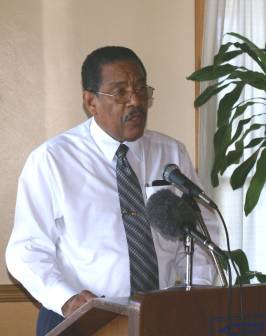We must not see electricity as a public service good to be subsidized by the state says Hon. Charles Savarin
 Roseau, Dominica – April 24, 2009……………… Minister for Public Utilities, Energy and Ports, Hon. Charles Savarin has outlined initiatives that have been undertaken in the last two decades in Dominica to develop the country’s renewable energy resources.
Roseau, Dominica – April 24, 2009……………… Minister for Public Utilities, Energy and Ports, Hon. Charles Savarin has outlined initiatives that have been undertaken in the last two decades in Dominica to develop the country’s renewable energy resources.
The Minister was at the time speaking at a Multi-Sector Stakeholder Consultation on the formulation of a National Energy Policy and Sustainable Energy Plan for Dominica in Roseau recently. Hon. Savarin also used the opportunity to call for a change in attitude on how the commodity, electricity, is viewed.
Hon. Savarin told participants that in 2004/2005, as part of its Eastern Caribbean Geothermal Development Project, (Geo-Caraibes), the OAS supported a study on the geothermal energy potential carried out by the French Geothermal Company (CFG). The study focussed on the Wotten Waven area and carried out geological, geophysical and geochemical surveys.
The Minister revealed that the 2005 report suggested that good conditions for commercial exploitation of the geothermal resource in the Wotton Waven are expected as “there is ample evidence of deep, high temperature reservoirs”.
Other initiatives undertaken include:
Ø In May and June of 2004, feasibility studies on hydro power for Dominica were carried out by the German Technical Assistance, GTZ. Part of the objectives of the studies was to assess the rehabilitation and upgrading of the Trafalgar and/or Padu hydro power plants according to DOMLEC’s priority. The reports concluded that “all of the investigated rehabilitation and upgrading options are technically feasible and economically and financially viable”.
Ø In 1992, the OECS Secretariat, with the assistance of the British Development Division in the Caribbean completed the wind energy assessment of the Caribbean in the islands that were covered by the Eastern Caribbean Wind Energy Resource Assessment carried out in 1982-1984 by the Caribbean Meteorological Institute. The northeast corner of the island, that is Crompton Point area, was identified as the most promising area for wind energy development in Dominica.
Ø In the July, 2002 study published by the University of the West Indies Centre for Environment and Development (UWICED) entitled “The Potential of Renewable Energy Technologies-Diversifying Dominica’s Energy Supply”, five (5) sites were identified for further study.
Ø In 2003, the GTZ carried out a wind energy assessment for Government. This study covered nine (9) sites on the southeast coast and five (5) sites in the northeast. The reports stated that the northeast coast of Dominica present the best opportunities for large scale development of wind power on wind farms. The report also stated however that the weakness of the electricity distribution system does not currently allow for large injections of power along the east and northeast coasts.
Ø In April, 2008, the Dominica Government signed a Transnational Partnership Agreement(TPA) with the Regional Councils of Guadeloupe and Martinique and other development agency partners to continue research into the feasibility of geothermal development in the Wotton Waven area and of interconnectivity between Dominica and Guadeloupe and Martinique for geothermal power transmission. The Geothermie Caraibe project as it is called, funded under the INTERREG III B programme of the EU, is the preliminary phase of the more comprehensive geothermal development initiative. The INTERREG III B project is focussed on key points which will ensure the success of the project from a technical, administrative and legal point of view.
Ø The TPA is the prelude to the project ” Preparation of a Geothermal- bases Cross- Border Electrical Interconnection in the Caribbean” financed by the European Union , AFD and FFEM to the tune of 5.5 million euros over three years. Within the next two years the investment will provide Government with technical, financial, institutional and legal information for the establishment of geothermal plants with the capacity to supplement local needs at much reduced cost and to sell 100 megawatts of electricity to Guadeloupe and Martinique via submarine cable as part of the EU’s 20/20/20 commitment.
Ø In determining the use of four(4) 30MW “single flash” turbines for the production of 120 mega watts of electricity, the preliminary project evaluation determined total investment cost at between US$430 450 million
Ø In July, 2008, Government issued a license to West Indies Power (Dominica) Ltd for the exploration and exploitation of the geothermal resources in the Soufriere area. Since then WIPO with support from the Ministry of Energy and the Ministry of Housing, Lands and Telecommunications has identified the geothermal reservoir based on the necessary surface measurements i.e. the geological, geochemical and geophysical characteristics of the Soufriere Resource area. Results so far are sufficiently favourable to encourage the company to pursue the development of its proposed geothermal energy investment programme.
The Minister also pointed out that the challenge is to ” turn away from the established precept of seeing electricity as a public service good to be guaranteed and subsidized by Government, and treat our rich endowment in renewable sources of energy, more particularly hydro, geothermal and wind, as a resource to be harnessed and exploited for the production of electricity not only for local consumption but for export to neighbouring islands as well”.
The Multi- Sector Stakeholder consultation was preceded by a Government Stakeholder Meeting, which was attended by Dominica’s Minister for Energy and officials from his Ministry, a representative from the Organisation of American States (OAS), one from the CARICOM Energy Unit and an official from the European Commission Delegation in Barbados.






